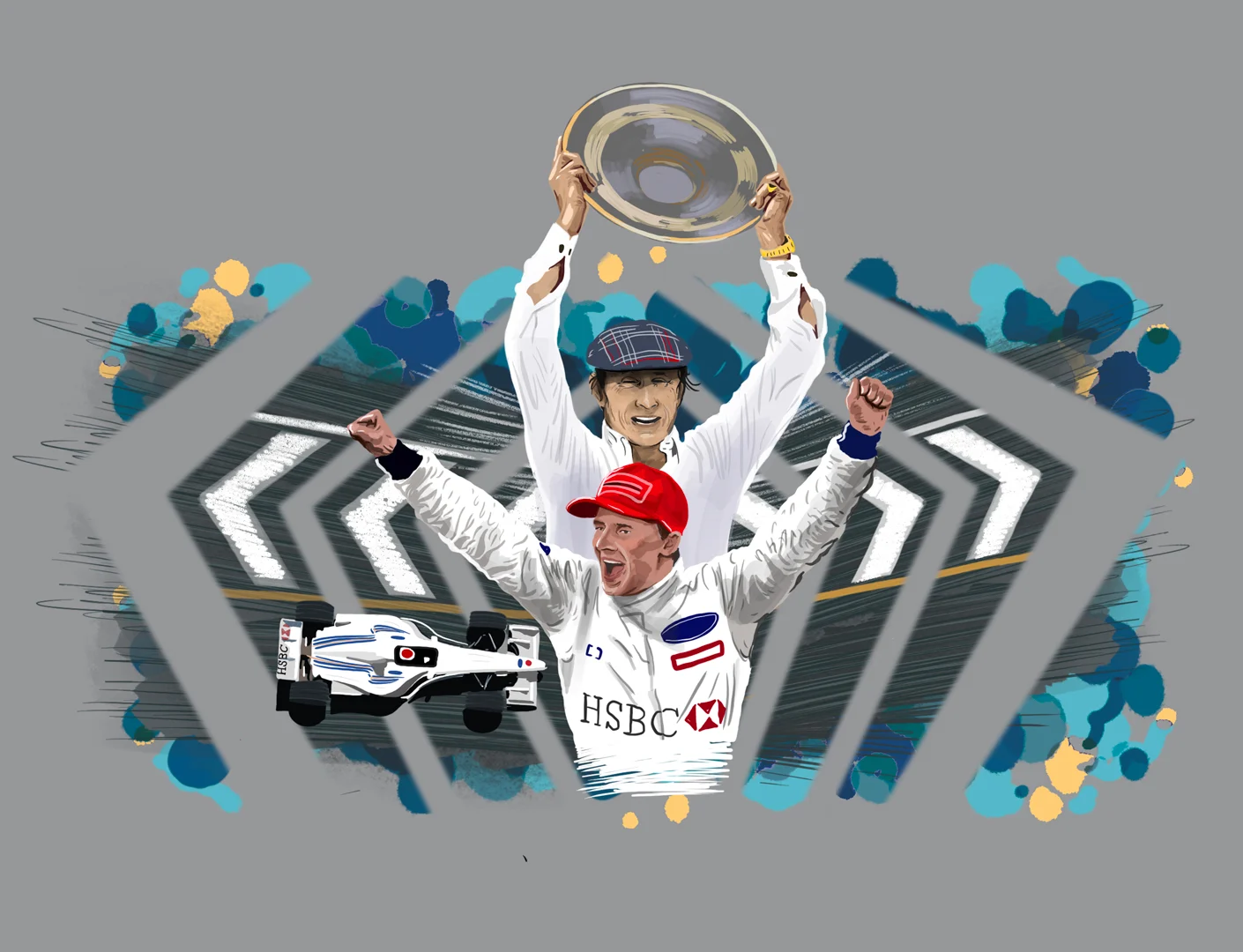Sir Jackie Stewart is a legend in Formula 1, first immortalising himself by winning three world titles and then founding his own Grand Prix-winning team with son Paul. Ahead of our live stream this evening of the 1999 European Grand Prix, we’re republished this special feature, originally published late last year, in which we spoke to the key characters at the rain- (and later champagne-) soaked Nurburgring on September 26, 1999, when the team took their first and only F1 victory in that chaotic and dramatic race…
Formula 1 was blessed with not one but two world champion team owners in 1997, with Alain Prost and Stewart taking different approaches with their new outfits. Whereas Prost purchased the existing and historic Ligier team, Stewart built on the huge success of Paul Stewart Racing in lower categories by creating a factory team from scratch backed by the financial might of Ford Motor Company.
Stewart was a shrewd operator – both on- and off-track – and used his vast experience and commercial nous to bring in a suite of top sponsors to give the outfit strength from the get-go. The first season in 1997 was tough, but a shock Monaco Grand Prix podium added a rosy tint. Year two – often the toughest for a new team – was a season to forget. But year three was enthralling. The SF3 was a quick little motor car.
And on their third-last race as an entity, having already agreed to sell the team to Ford, which would rebrand it Jaguar, they did what every owner dreams of – win a Grand Prix. Johnny Herbert, who joined the team that season, did the business at the European Grand Prix at the Nurburgring with team mate Rubens Barrichello third…
The third and final campaign
The SF3 was quick, with Barrichello the stronger and more consistent of the two drivers for most of the year. The Brazilian scored an encouraging fifth in the season-opening Australian Grand Prix, briefly led on home soil at Interlagos and finished on the podium in Imola – not a bad opening three races. A first pole for the team came in France, with Barrichello converting that into third. But arriving at the Nurburging, Stewart were fifth of nine teams in the constructors’ championship, 13 points (you got 10 for a win in those days) adrift of Williams. The feeling was they had underscored for the potential of the car…
David Webb, PA to Jackie Stewart in 1999: “When we rolled the SF3 out for a test at Silverstone, I remember Jackie saying ‘the car looks good and when it looks good, it generally is good’. We hadn’t even run the car and he reckoned it looked good. It came out the box and was pretty quick.”
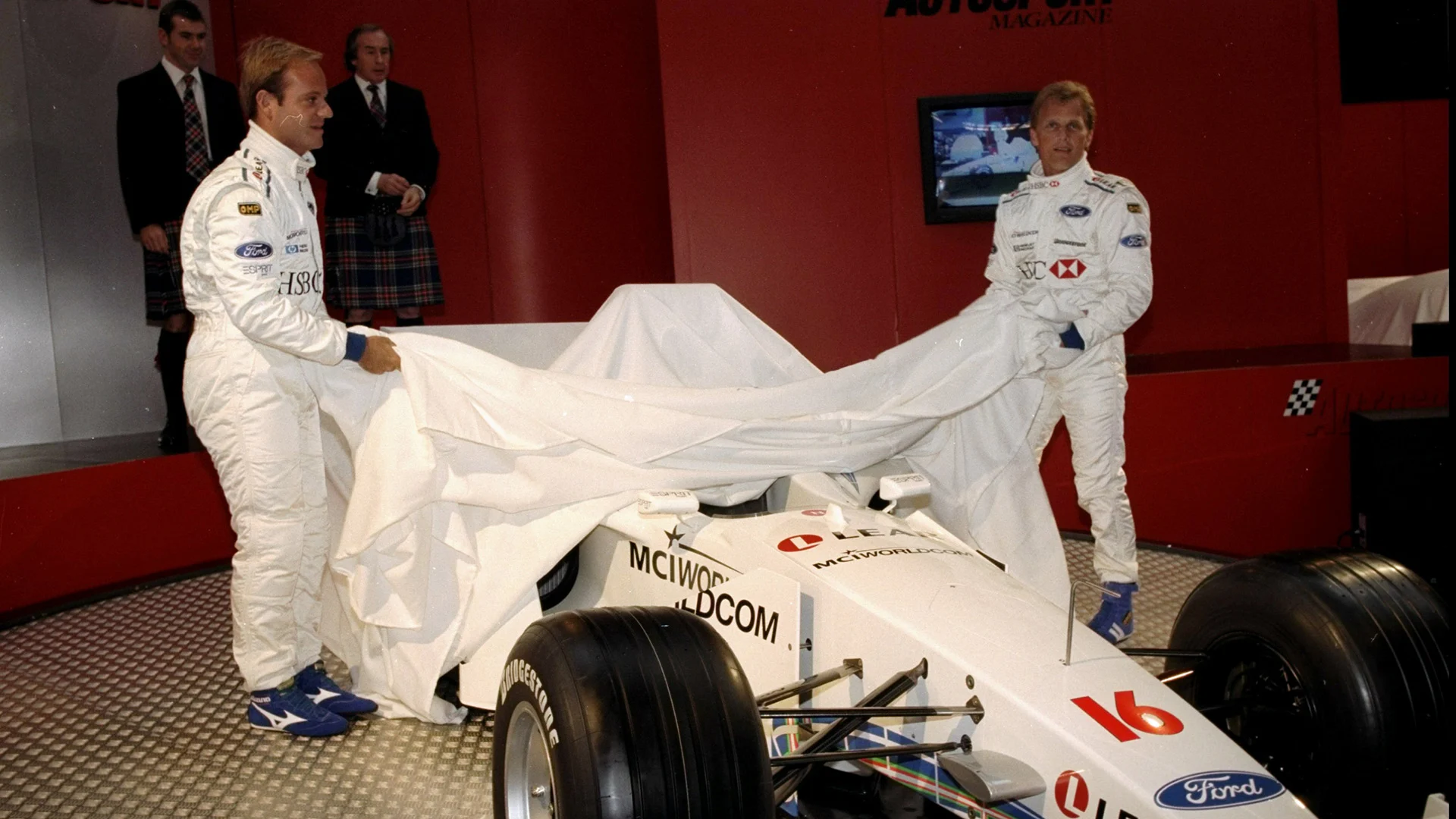
Paul Stewart: “Ahead of 1999, we had a big reshuffle in the company because we had grown so quickly and we needed to adapt. Martin Whitmarsh [then McLaren Managing Director] came up to me at testing in Barcelona and said ‘your car is looking pretty quick!’ That gave us a bit of confidence but we still didn’t really know where we would stack up. As it turned out, we were quick but fragile. In Australia, Rubens had a stop-and-go and still finished fifth. Rubens led in Brazil. When he drove down the straight, you could hear the whole grandstand chanting ‘Rubinho’. It gave me goosebumps. But engine failure robbed us of a strong result. It proved we had potential. We just had to convert.”
Dave Redding, Trackside Operations: “The car was very competitive. As the year went on, results just didn’t go our way. We were there or thereabouts a lot but it was much harder to score points in those days, as they were only awarded to the top six. So when we arrived at the Nurburgring, we felt we had missed a lot of opportunities. “
Johnny Herbert, Stewart Grand Prix driver: “Did I get on top of the car early on? Probably not. I struggled a bit more than Rubens did. He came out of the blocks quickly, as you’d expect. But then we changed the differential in Austria, and suddenly I felt more comfortable. Before, I wasn’t attached to the rear of the car. It was floating around.”
READ MORE: Jackie Stewart at 80: The legend, his greatest drive, and the man himself
Arriving in Germany
Having looked pretty reasonable in practice at the Nurburgring, round 14 of the campaign, Stewart Grand Prix failed to excel in the changeable conditions in qualifying. Herbert was already on the back foot after being forced to use the spare car when the team discovered an electrical problem. Both he and Barrichello also ran the harder compound Bridgestone tyre – and it proved to be the wrong decision. They ended up 14th and 15th respectively.
David Webb: “We arrived at the Nurburgring thinking it was just going to be another weekend. We stayed in cabins nearby. [Rockstar] Phil Collins, who is a great friend of Jackie, flew in – as he often did – and joined us for dinner. We drove into the circuit together, navigating the narrow roads through the forest without the aid of GPS!”
Gary Anderson, Technical Director: “The car was stronger than our qualifying positions suggested and we were hopeful race day would offer us a chance to recover, especially as the conditions were predicted to be changeable.”
Johnny Herbert: “Around 30km ahead of the Nurburgring is Spa – and we all know how changeable the weather is there. The wind was blowing directly up the straight. On my way back from the bathroom before the race, I really noticed it. I always thought you needed to be aware of every factor that could influence a race. I knew it could change direction but I was aware of it. I got off the line OK – just a bit of wheelspin - and quickly got into a rhythm. The car felt good. The tyres were feeling OK and we planned to run a long first stint.”
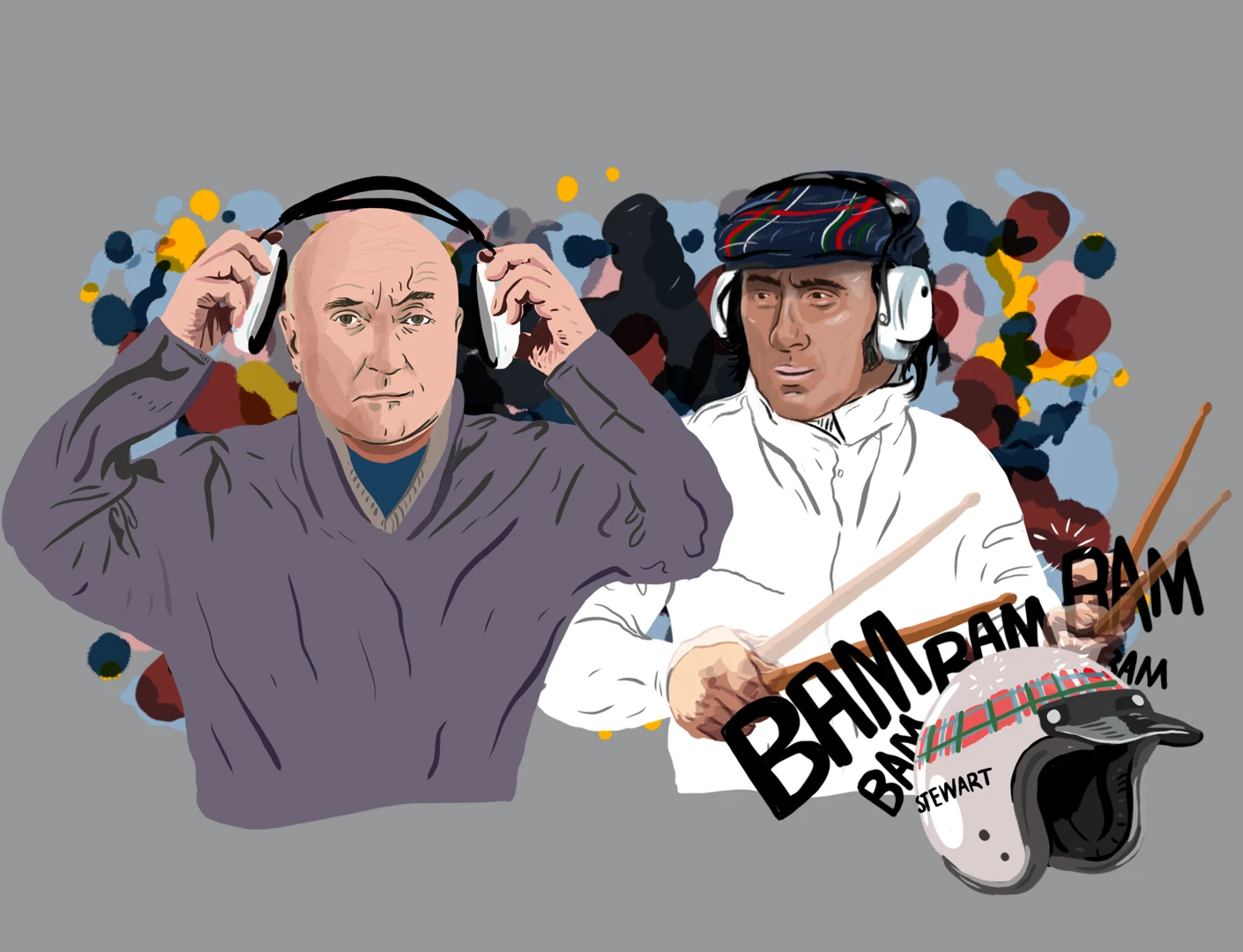
The decision that made the difference
Jordan’s Heinz Harald Frentzen had started on pole and led the opening half of the race reasonably comfortably. Light rain fell sporadically, intensifying to the point that some drivers – including then championship leader Mika Hakkinen (who went on to win the title that year) in the McLaren – for wet tyres. It proved a disastrous move as the shower only lasted a few minutes. Others, including Herbert and Barrichello, stayed out – and that hauled them into contention for points. Then came the masterstroke. When the rain came back on lap 35 – it was harder and would stick around for longer. Herbert was on an in-lap and boxed, taking wets. Suddenly more than just a few points were on offer.
Johnny Herbert: “It was threatening to rain heavily all the way through the race. As I rounded the hairpin, on my in-lap, I saw a big black cloud heading towards us. And then it started to rain quite heavily. I went on radio and asked for wets. They asked if I was sure as they had slicks ready – and I said yes. As I pulled away, the rain started tipping it down. Rubens pitted two laps later and took slicks. The feeling among others was that the rain wouldn’t last long. But it lasted for about 10-15 minutes.”
Gary Anderson: “There were some big drops of rain coming down in the pit lane as Johnny was coming in. It was one of those situations where if it did come down, it was going to be very wet. I said go for wets. Johnny wanted wets. Jackie backed us. He was always involved in the decisions, because he knew from experience what you were trying to. He would always back you up, unless you were stupid!”
For those last 10-15 laps, I was in real pain
Jackie Stewart: “The strategy decisions were a team effort. We were feeling very uncomfortable about the whole thing. The rain was the biggest issue. Gary and I were up and down to the end of the pit lane to see the clouds coming back and forward. The two of us were running like a couple of young things, trying to work out when someone would come in. Johnny made the call with us. He came in at the right time and Rubens didn’t.”
Rubens Barrichello: “At the end of the day, I was in such a good humour after the race because although I didn’t [win] the team had done it. I knew I hadn’t done it because of one wrong choice. I had been wishing for more rain and more rain and I was asking for something that came my way - but I kept the slicks. For two laps, I was so slow on the slicks, I lost the race because of that. It’s fundamental that whenever you ask for something, you are ready to grab it and I wasn’t. That day, I was lucky just to finish third.”
David Webb: “We used to send people from the marketing team up wind to check on the weather. At the Nurburging, they were sat on the side of the track with a pair of binoculars and would update us on the conditions.”
Dave Redding: “In those days, we didn’t have all tools we have now, so we were more reliant on a driver judging the change of conditions. You could tell the driver what tyres others were taking, but you were relying on him. If he said wets or slicks, he steered the call. If he felt he could make it work, that’s what we would do.”
Paul Stewart: “It should have been a one-two. I still kick myself for what I did that day in observing protocol. It was chaos when the rain started increasing in intensity. Rubens came on the radio and asked ‘shall I come in now? I can come in if you call me now’. The others on the pit wall didn’t pick it up as there was a lot of discussion going on. I picked it up, but it would have broken protocol if I’d said ‘come in now’. If he had done, and chosen to take wets, he probably would have won.”
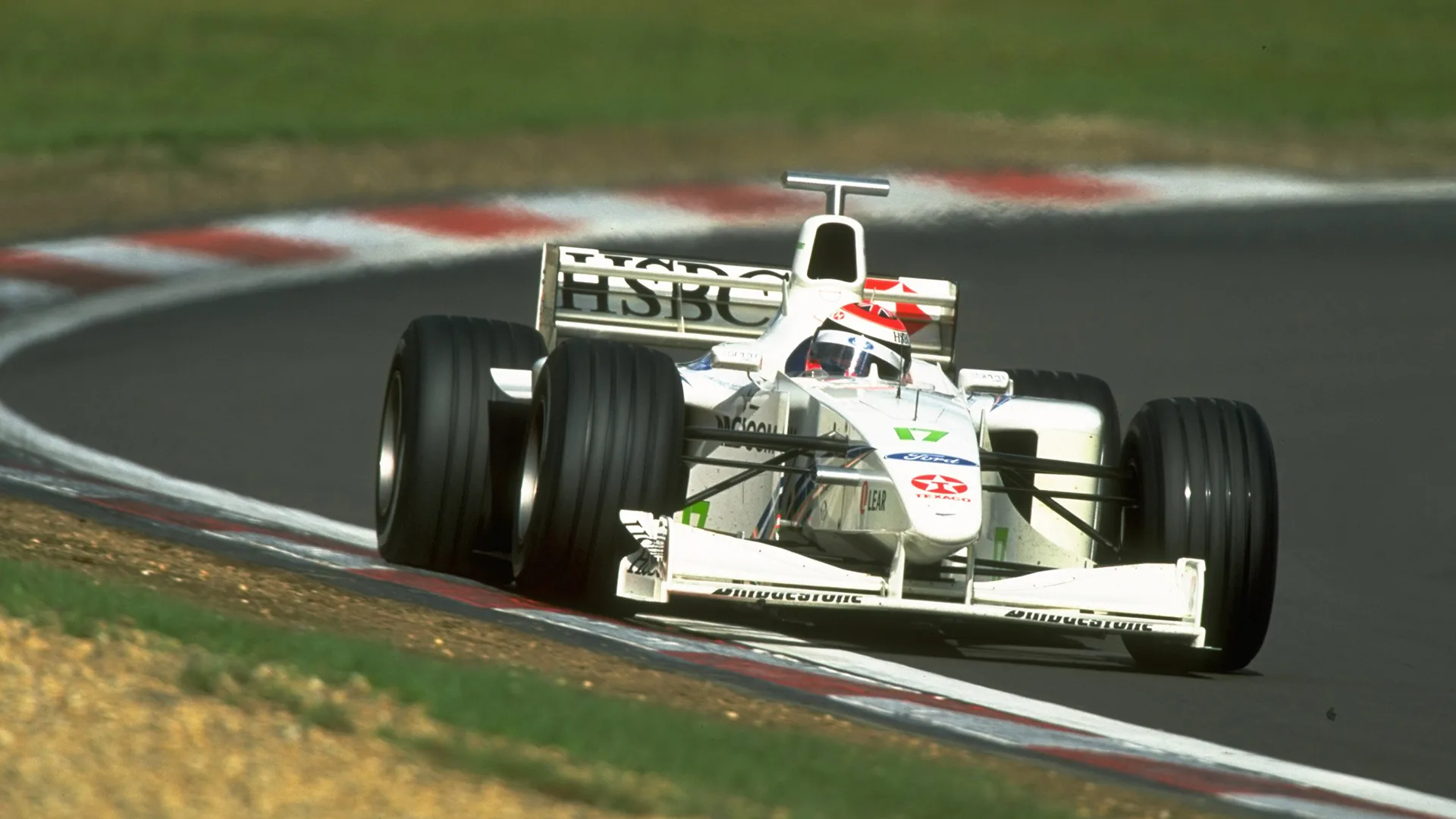
Taking the lead
The favourites were dropping like flies. First, long-time leader Frentzen bit the dust courtesy of an electrical problem, handing David Coulthard the lead. But the McLaren driver wasn’t there for long, the Scot getting caught out and skating off. Giancarlo Fisichella threw away victory when the Benetton racer went off the road, too, paving the way for Ralf Schumacher. But the Williams driver, who had yet to win a race by that point, was undone by a puncture. That put two-time race winner Herbert into the lead. He just had to hold on for 17 laps…
Jackie Stewart: “I was so nervous! I led a few races in my day and know things can happen until the chequered flag comes out.”
Johnny Herbert: “I was flying out there. I remember Fisichella running off and then Ralf picked up the puncture and suddenly I was in the lead. I took the risk with the wets – and it was paying off! Then it was about judging the pace, but that was always a strength of mine. I was happy with the balance of the car. I had a good lead and I extended it to more than 20 seconds while driving within myself and having a bit in the tank if I needed it. But for those last 10-15 laps, I was in real pain (he suffered severe injuries to both his feet in a pre-F1 Formula 3000 crash). Fortunately I had a gap, so I just had to keep it consistent, and would alternate braking with right and left feet to ease the pain. When I won at Silverstone [for Benetton in 1995], I was screaming in the car for the last 13 laps, so bad was the pain, so this wasn’t so bad!”
Dave Redding: “Johnny was always in pain – but he never complained. He just got on with it. We weren’t worried. And the Nurburgring wasn’t a big braking circuit – so it wasn’t as painful as somewhere like Imola.”
Gary Anderson: “That final stint was very tense, especially as Stewart Grand Prix hadn’t won a race up until that point and so many people had gone off. Our reliability was a little suspect too so that added to the tension. It was all about Johnny driving conservatively, but not so conservatively that you lose confidence in your driving and lose tyre temperature and then suddenly you don’t have any brakes. Johnny was an experienced driver, he recognised where the conditions were tricky and where it was less risky so you could push a bit harder.”
Dave Redding: “We had had some unreliability that year. We weren’t thinking we would break down but rather that others would pick up the pace and catch us. As it turned out, Rubens was the fastest guy on the track at the end – and at one point, we thought we would get a one-two. But he just ran out of time to catch Jarno Trulli. During the last 15 laps, first I thought we weren’t going to win. Then I thought maybe we can win and then I thought maybe he’s not going to finish. It was so tense.”
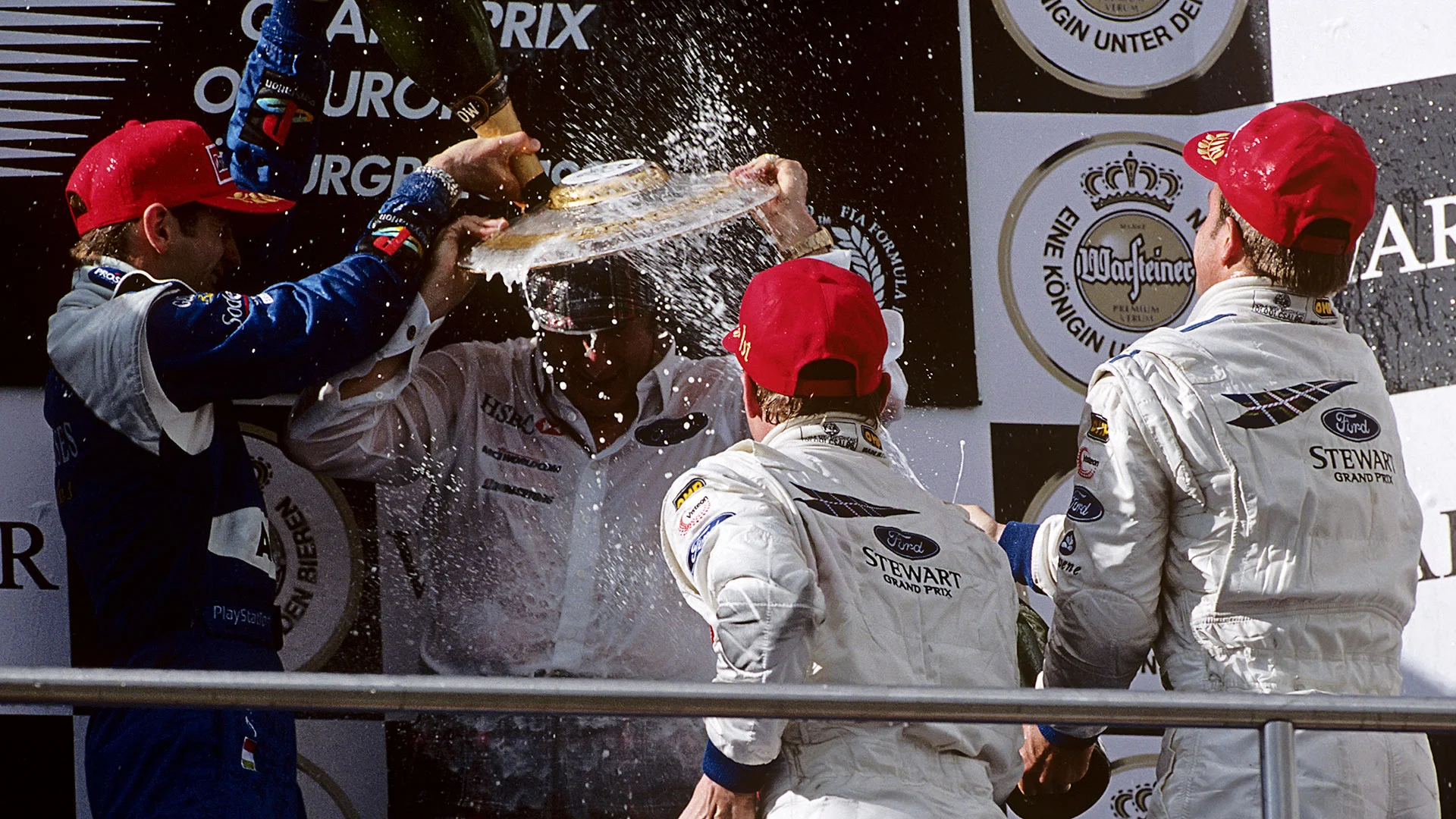
An explosion of emotion
As you’d expect, there was pandemonium after the race. Stewart Grand Prix were a proper racing team – and respected by their rivals, so this triumph was a popular win. For Sir Jackie Stewart, it was even more special as it came at a circuit (although very different to the Nurburgring he had driven) that he had enjoyed so much success as a driver with three wins, most recently in 1973.
Johnny Herbert: “The first person I saw when I got out of the car was Rubens. We had a good relationship but I could see the disappointment in his face, of course. He had been at the team from the beginning. He got their first podium, in Monaco. They respected him massively. So of course he was disappointed. For me, it was so positive. I hadn’t expected it. Then I saw my engineer and gave him a hug. And then Jackie. He carried a case of Moet champagne to every race for special occasions. And for the second time in the team’s history (the first was Monaco 1997), we cracked a bottle open.”
Jackie Stewart: “It was a wonderful moment. When it was time to collect the trophy, Pasquale [Lattuneddu, former FOM Chief of Operations] came running after me, because I hadn’t thought about the podium protocol before, so I was back in the garage. I ran to the podium and remember standing there with both drivers getting drenched in champagne. It was terrific. But I do regret that it was me up there and not Paul. It would have been nice for him to be up there, as I’d been on the podium a few times!”
Paul Stewart: “I know if I had asked my father if I could I go on the podium, he would have said yes but I didn’t say anything, because it was important for him to be up there. I looked at him and said ‘you better take your raingear – which he was wearing over his Tartan – off before you go on the podium’.”
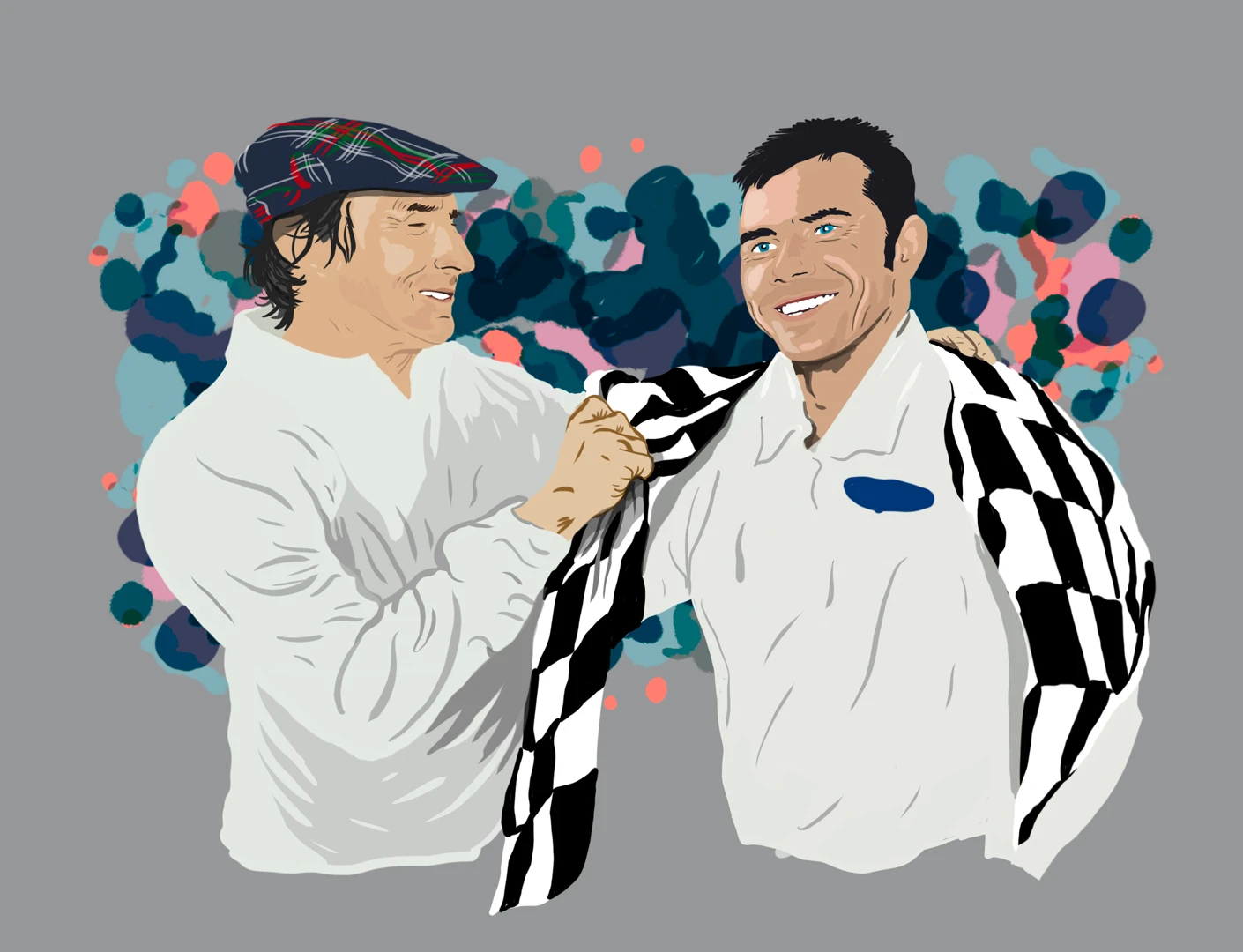
Jackie Stewart: “After the podium, a very nice thing happened. The man who waved the chequered flag our win in 1999 said he was also the man who waved the flag for me when I won at the Nurburgring in 1968, when it was extremely wet and foggy. That’s what he told me, anyway, and I couldn’t argue with the guy!”
Paul Stewart: “My father gave me the flag and said ‘I want you to have this’. Bless him. It was his way of saying 'thanks for letting me go on the podium'. The flag sits in my home. I never got it signed, it’s just as it is.”
Gary Anderson: “One thing that stuck out to me was that Phil Collins was there. He had his headset on during the race, so could listen to the discussions we were having. After the race, he came up to me and said ‘I’d like to compliment you on that because I know who won that race’. That was nice.”
Paul Stewart: “I felt for Rubens, as he was the guy who had been with us for the whole three years. If he had left with a win, it would have been magical for him and for us. He had risked his career by coming with us – a new team. But I’m not taking anything away from Johnny. It was a fantastic win and he was a pro. I’ve known him from the days when he was in F3 and F3000. For him to win a race with us meant a great deal.”
David Webb: “When we thought we were going to win, everyone headed for the pit wall and hung over in celebration. Jackie was then bombarded by press and on the podium, he got soaked. We had a celebration in our motorhome but we didn’t stay around for long as we had a plane to catch.”
For a new team, in only its third year, to achieve what we had done was quite something.
A quick escape
Paul Stewart: “Monaco 1997 was far more emotional but 1999 was fantastic. I wanted to stay at the track and hang out a bit but we had to get back on the plane. My father said ‘come on let’s go’, he’s never been one for celebrating. I remember [then Mercedes engine boss] Norbert Haug calling me and asking ‘where are you? I’m looking for you’. I said we’ve left to which he replied: ‘You leave when you won?’ He was giving me s***! It was nice to get a win that people felt we didn’t cheat them out of anything.”
Jackie Stewart: “Ken Tyrrell used to say ‘when the show was over you get out as soon as you could’. So after the race, we pulled ourselves together and headed to the airport. I had a Scottish plane called a Jetstream that we used for Paul Stewart Racing and Stewart Grand Prix. Norbert called and was dumbfounded we had left – he thought there was going to be a hell of a party and they wanted to join in. It was a great thing for a young team to get the victory.”
David Webb: “We had a slot time, which we never missed, but that one was delayed for an hour at least to allow for celebrations in the motorhome. When we crossed the line, my main priority was thinking about how we were going to get out of the track. We were flying to Copenhagen on Monday in Jackie’s plane – we called it the Tartan Terror - to do a sponsorship engagement so we had to make sure we got in the convoy with police escort to the airport. Miss that and my life wasn’t worth living! Once on the plane, they brought out the champagne.”
Dave Redding: “The win was extremely satisfying. Leaving the circuit on Sunday night, some of the guys were elated, almost hysterical, and others – a bit like me – were just reflecting on it and it was only a couple of days later that it really sunk in. We did have a few beers at the airport, though!”
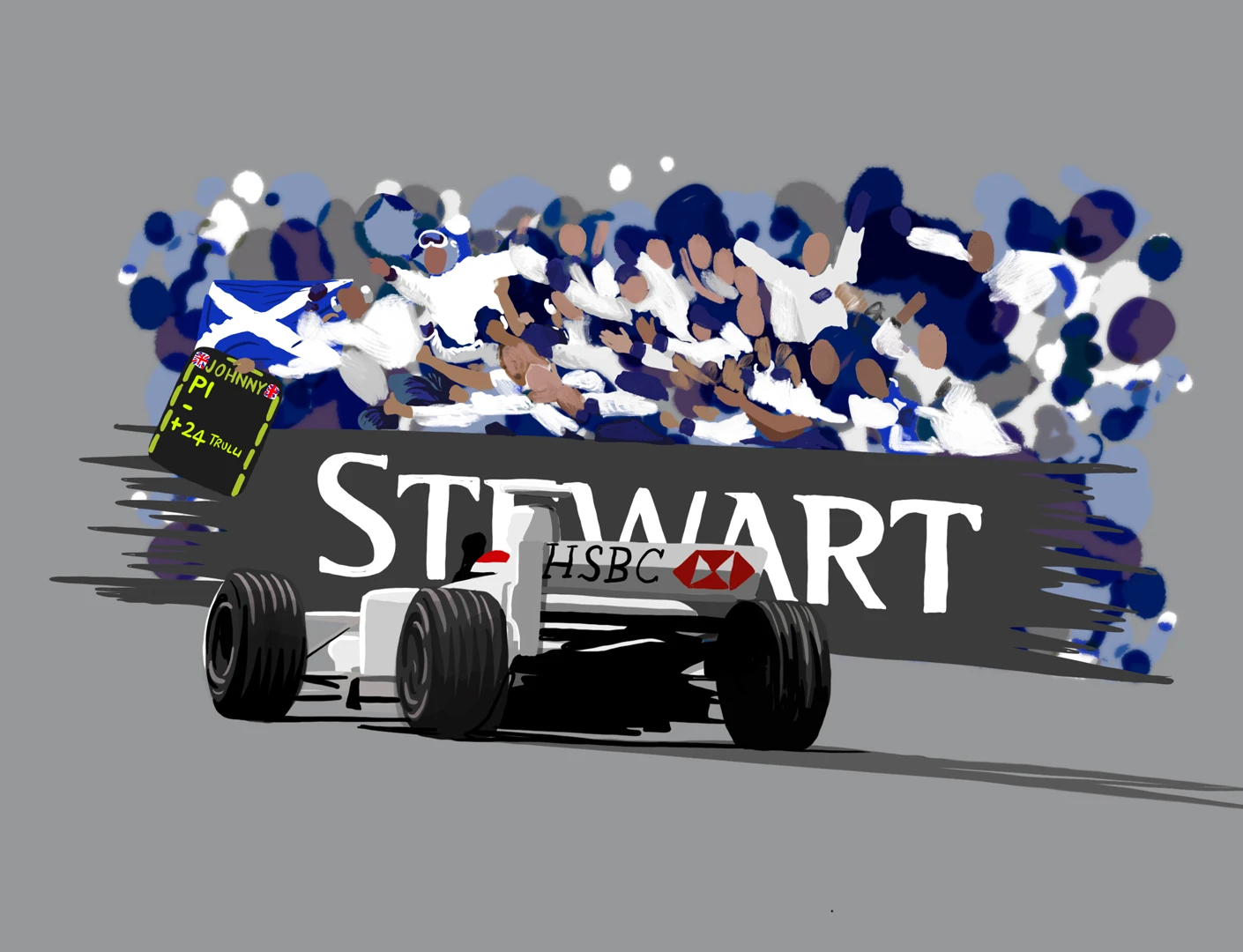
Celebrating as a team
Stewart Grand Prix was a true family team. Those who worked for the outfit lived and breathed Formula 1. Many of them had been with Paul Stewart Racing in lower categories while others had taken a risk in joining the fledgling team. It’s why the Stewarts were so keen to share the success. Everyone was given a print to commemorate the day…
Dave Redding: “On Tuesday, Jackie shut the factory. Everybody stopped worked and he gave one of his famous speeches. He wanted the team to know this win was for everyone. We still had a lot to do, there were two more races left, but we stopped to take in the moment and have a glass of champagne to toast the achievement.”
Jackie Stewart: “The factory had as much to do with the win as the race team. We had a very strong little group of people. Our factory was in the same building as Red Bull are in now, in Milton Keynes, though they are about four times bigger than we were. Christian Horner’s office was my office! For a new team, in only its third year, to achieve what we had done was quite something. And doing so under the Stewart Grand Prix banner, before it became Jaguar the following year was very special.”
Gary Anderson: “The people were very important to Jackie. He would go round the factory every Tuesday and say hello to everyone. He would know everyone’s name, the names of those in their family and if their kids had colds. He just knew everyone and how to motivate them. He was very good at that.”
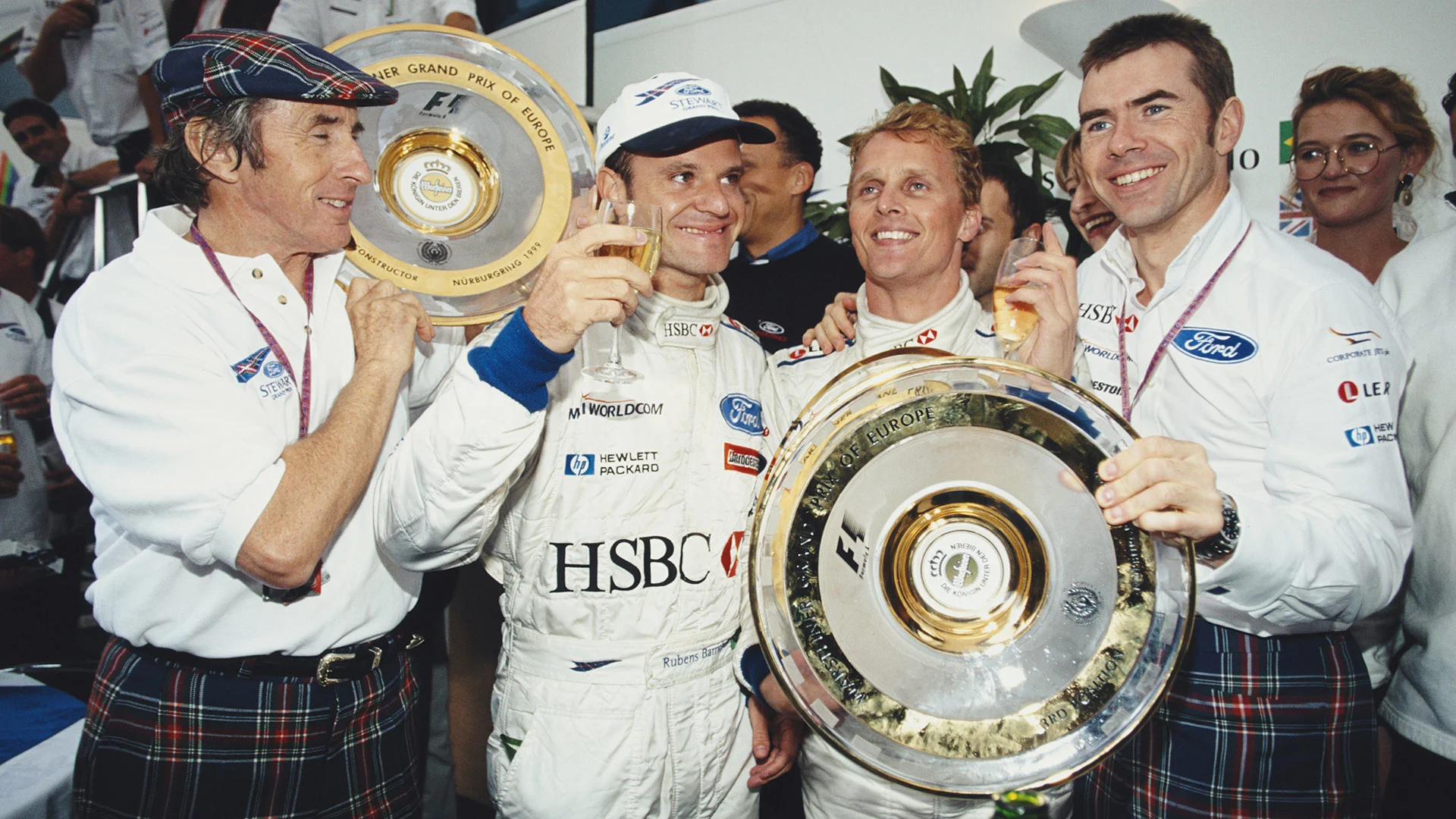
Jackie Stewart: “Paul has got the drivers’ trophy, and I’ve got the constructors’ trophy. We’ve got the car, too. It’s in a barn with about five Stewart Grand Prix chassis, two Tyrrells and all the trophies. The SF3 we have is runnable. It’s the only one we have kept runnable. It costs a fortune – around £350,000 – to make these things runnable.”
Paul Stewart: “I was enormously proud of all the team for us to have a win. It was a huge accomplishment. People tend to forget second and thirds, but a win, it was huge. I looked at a picture of the team celebrating the other day and recalled how much of a risk people took in their careers to work for us – a new team. They were rewarded for their belief and commitment with that win. My father and I were the face of the team, we were the ones with the Tartan trousers on, but everything we did was a team effort.”
Johnny Herbert: “Every win is important. But I think the best race I ever did in F1 was the following one, in Malaysia, where I finished fourth. The win at the Nurburgring gave me so much confidence for that following race. But looking back now, after my crash – and I always harp on about it but it made a big difference to my career – it was my last win in F1 and at that point, I wasn’t expecting it. So it will always be very special.”
We are showing this remarkable race in full here on F1.com tonight (Wednesday) at 1800 UTC (1900 BST). Click here for more details.
Stewart Grand Prix went on to finish an impressive fourth in the constructors’ championship, just one point clear of Williams. The team became Jaguar the following year, but they never hit the same heights again – with Ford selling the team to Red Bull ahead of the 2005 season. For Stewart, they are one of only 35 teams – out of 136 in the championship’s history – to have achieved a Grand Prix victory – and what a win it was.
This feature was originally published on December 23, 2019.
Next Up
Related Articles
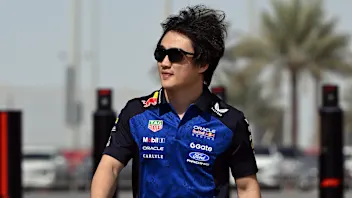 Who are the reserve drivers for each F1 team in 2026?
Who are the reserve drivers for each F1 team in 2026?/Winners%20&%20Losers%20DISPLAY%20template%20(1).webp) Winners & Losers5 Winners and 3 Losers from the second Bahrain test
Winners & Losers5 Winners and 3 Losers from the second Bahrain test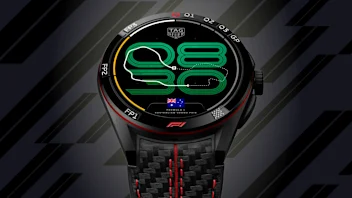 UnlockedPredict the Australian GP Winner for a chance to win
UnlockedPredict the Australian GP Winner for a chance to win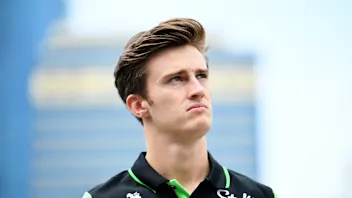 F2 champion Pourchaire joins Mercedes as Development Driver
F2 champion Pourchaire joins Mercedes as Development Driver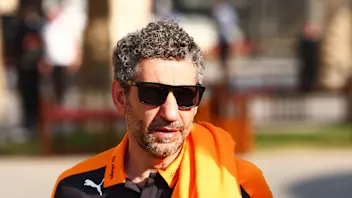 Ferrari and Mercedes ‘the teams to beat’ – Stella
Ferrari and Mercedes ‘the teams to beat’ – Stella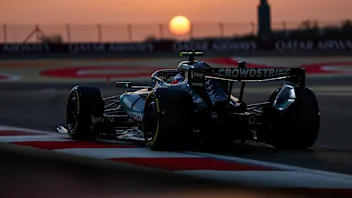 BettingHow the F1 betting markets changed after testing
BettingHow the F1 betting markets changed after testing
